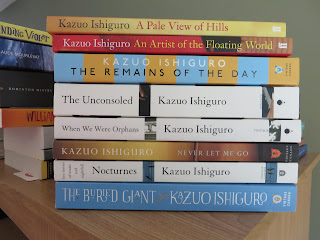I have been slowly rationing out the reading of them over a few months, but I plan on reading the lot this year, and I am alright with that, because these are books that I will come back to again and again.
A Pale View of Hills is Ishiguro's first novel, and the first of two books known as his Japanese novels. I should admit that a few years ago I had read An Artist of the Floating World, and that when I had finished I was embarrassed because I didn't know much about that time (post World War II). So I have made a point of getting informed about Japan. I have studied customs, food, history and geography. I really wanted to understand these novels, get the cultural references etc. It is still not an easy job to do, and Ishiguro is the first to say that he did not write in the Japanese style (what ever that is), but just about characters in Japan. I want to understand and to know more about the Japanese art of storytelling, but I have barely begun reading Japanese authors (I have a list of who I would like to read next!)
This time around, I felt I had a better grasp of what Japan is about (but still a very small understanding of such a rich and beautiful culture!). So reading this book, I was happy to see that I had a better awareness of it's content (there was a lot of "Oh, I know what this is!" instead of "Huh?").
Continuing on to a re-reading of An Artist of the Floating World, I was able to see the theme of both of these novels, and to understand what they were trying to tell me. They are both retrospects of significant times in the lives of both protagonists with a the humanizing admission that they were not perfect, that they made mistakes and that they could live with that fact in later years. Ishiguro is a writer who carefully leads you along the same path as the protagonist, he gently supports you through the crisis of each person, and then helps you to see that there is and can be an acceptance of and a resolution to each circumstance, but not perhaps what you were expecting or hoping for. Both books are almost delicate in the delivery of their stories. If this is a Japanese story telling trait, I have no idea, but I hope it could be. I can't wait to find out!



No comments:
Post a Comment